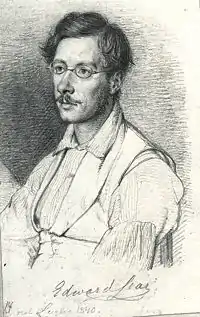runcible
English
WOTD – 12 May 2018
Etymology

An 1840 portrait of Edward Lear by Wilhelm Marstrand. Lear coined the nonce word runcible in his poem The Owl and the Pussy-cat.

Lear’s drawing of a “dolomphious duck” using a “runcible spoon” to catch a “spotted frog”[1]
A nonce word[2] coined by the English artist and poet Edward Lear (1812–1888) in his poem The Owl and the Pussy-cat (published 1870). It has been suggested that the word was modelled after rounceval, rouncival (“a large pea, the marrowfat”) (late 16th c.).[3]
Pronunciation
- (Received Pronunciation) IPA(key): /ˈɹʌnsɪb(ə)l/
- (General American) IPA(key): /ˈɹʌnsəbəl/
- Hyphenation: run‧ci‧ble
Adjective
runcible (not comparable)
- (humorous) A nonce word used for humorous effect, and perhaps originally to maintain the number of syllables in lines of poems. [from c. 1870]
- 1870 February, Edward Lear, “The Owl and the Pussy-cat”, in J[ohn] T[ownsend] Trowbridge and Lucy Larcom, editors, Our Young Folks. An Illustrated Magazine for Boys and Girls, volume VI, number II, Boston, Mass.: Fields, Osgood, & Co., 124 Tremont Street, OCLC 29249045, page 112:
- They dined on mince and slices of quince, / Which they ate with a runcible spoon, / And hand in hand on the edge of the sand / They danced by the light of the moon,— / The moon, / They danced by the light of the moon.
- 1872, Edward Lear, “Twenty-six Nonsense Rhymes and Pictures”, in More Nonsense, Pictures, Rhymes, Botany, etc., London: Robert John Bush, 32, Charing Cross, S.W., OCLC 1419124:
- The Dolomphious Duck, / who caught Spotted Frogs for her dinner / with a Runcible Spoon. […] The Rural Runcible Raven, / who wore a White Wig and flew away / with the Carpet Broom.
- 1909 February, J[ohn] C[ollis] Snaith, “Araminta”, in The Forum, volume XLI, New York, N.Y.: The Forum Publishing Company, OCLC 317236783, pages 157 and 169:
- [chapter XI (Miss Perry is the Soul of Discretion), page 157] "I think the hat must flop a little too much," said Miss Perry, "in places. It makes people turn round to stare at it." / "Of course it does, you foolish person," said Jim, with little guffaws of rapture. "It is an absolute aboriginal runcible hat. How did you come by it? It seems to me there are deep minds in this." […] [chapter XIII (High Revel is Held in Hill Street), page 169] "I never saw such a creature," said Jim. "Those Gainsborough frocks and those runcible hats are maddening." / "Well, laddie," said Jim's mother, "you must paint her and make her and yourself famous."
- 1973, Thomas Pynchon, Gravity’s Rainbow, New York, N.Y.: Viking Press, →ISBN; republished as Gravity’s Rainbow (Penguin Twentieth-century Classics), New York, N.Y.: Penguin Books, 1995, →ISBN, page 597:
- Presently, out of breath, they arrive at the pier where the Badass and its division, four haze-gray piglets, are tied up, to find the runcible spoon fight just under way at the center of a weaving, cheering crowd of civilian and military drunks.
- 2015, Neal Asher, chapter 1, in Dark Intelligence: Transformation, Book One, London: Pan Books, →ISBN, page 16:
- The miners of Talus push a runcible transfer gate, enmeshed in hardfields, into the giant planet's core. Here, they prompt thousands of tons of nickel-iron to squirt through underspace, via the gate, to a distant location. […] Silica sand billows into a runcible gate on the planet Fracan, where a desert is being vacuumed away to bedrock.
-
Derived terms
References
- From Edward Lear (1872), “Twenty-six Nonsense Rhymes and Pictures”, in More Nonsense, Pictures, Rhymes, Botany, etc., London: Robert John Bush, 32, Charing Cross, S.W., OCLC 1419124.
- See, for example, J[ohn] T[ownsend] Trowbridge and Lucy Larcom, editors (November 1872), “Our Letter Box”, in Our Young Folks. An Illustrated Magazine for Boys and Girls, volume VIII, issue XI, Boston, Mass.: James R. Osgood and Company, 124 Tremont Street, OCLC 29249045, page 703, column 1: “"Runcible" is a nonsense word introduced in the nonsense poem for the comical effect of a well-sounding epithet, without any shadow of a meaning.”
- “runcible” (US) / “runcible” (UK) in Oxford Dictionaries, Oxford University Press.
Further reading

- “Runcible spoon”, in The Word Detective, November 2009, archived from the original on 5 March 2017
This article is issued from Wiktionary. The text is licensed under Creative Commons - Attribution - Sharealike. Additional terms may apply for the media files.